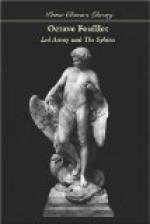Under the nominal patronage of this mystic duenna, the Little Countess enjoys an absolute independence, which she uses to excess. After spending the winter in Paris, where she kills off regularly two horses and a coachman every month for the sole gratification of waltzing ten minutes every night in half a dozen different balls, Madame de Palme feels the necessity of seeking rest in the peace of rural life. She arrives at her aunt’s, she jumps upon a horse, and she starts at full gallop. It matters not which way she goes, provided she keeps going. Most generally she comes to the Chateau de Malouet, where the kind-hearted mistress of the house manifests for her an amount of predilection which I can hardly understand. Familiar with men, impertinent with women, the Little Countess offers a broad mark to the most indiscreet homage of the former, and to the jealous hostility of the latter. Indifferent to the outrages of public opinion, she seems ready to aspire to the coarsest incense of gallantry; but what she requires above all things is noise, movement, a whirl, worldly pleasure carried to its most extreme and most extravagant fury; what she requires every morning, every evening, and every night, is a break-neck chase, which she conducts with frenzy; a reckless game, in which she may break the bank; an uninterrupted German, which she leads until dawn. A stoppage of a single minute, a moment of rest, of meditation and reflection, would kill her. Never was an existence at once so busy and so idle; never a more unceasing and more sterile activity.
Thus she goes through life hurriedly and without a halt, graceful, careless, busy, and ignorant as the horse she rides. When she reaches the fatal goal, that woman will fall from the nothingness of her agitation into the nothingness of eternal rest, without the shadow of a serious idea, the faintest notion of duty, the lightest cloud of a thought worthy a human being, having ever grazed, even in a dream, the narrow brain that is sheltered behind her pure, smiling, and stupid brow. It might be said that death, at whatever age it may overtake her, will find the Little Countess just as she left the cradle, if it were possible to suppose that she has preserved its innocence as well as she has retained its profound puerility. Has that madcap a soul? The word nothingness has escaped me. It is indeed difficult for me to conceive what might survive that body when it has once lost the vain fever and the frivolous breath that seem alone to animate it.




